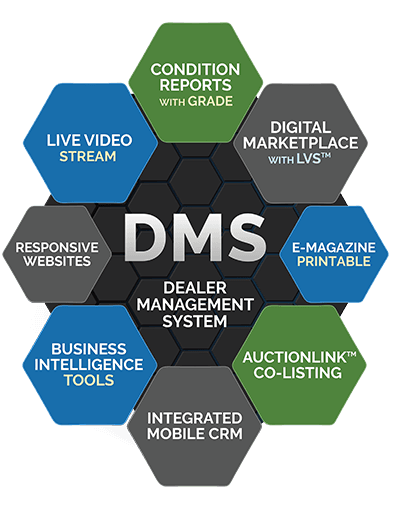Software for Dealership Management: Core Platforms

A modern car dealership is a complex ecosystem with many moving parts. From tracking hundreds of vehicles and managing customer relationships to marketing services and processing repair orders, the sheer volume of data and tasks can be overwhelming. Relying on outdated spreadsheets, separate calendars, and disconnected software is no longer a viable option for dealerships that want to grow and thrive. To achieve peak efficiency, enhance customer experience, and drive profitability, dealerships today require a suite of integrated core platforms.
This article breaks down the essential categories of software for dealership management, explaining the critical role each platform plays and why an integrated approach is the key to unlocking your dealership’s full potential.
The Command Center: Customer Relationship Management (CRM)
At the very heart of any modern dealership’s software ecosystem is the Customer Relationship Management (CRM) platform. A dealership CRM is far more than a digital address book; it is the central nervous system for all customer interactions, tracking every lead, conversation, and transaction from initial contact to long-term ownership.
Core Functions of a Dealership CRM:
- Lead Management: The CRM captures leads from all sources—your website, third-party sites, social media, phone calls, and showroom walk-ins—and funnels them into one organized system. It allows for intelligent lead distribution to your BDC or sales staff, ensuring prompt follow-up.
- Sales Pipeline Visibility: It provides a clear view of where every customer is in the sales process, from a new prospect to a confirmed appointment to a closed deal. This helps sales managers forecast effectively and coach their teams.
- Communication Tracking: Every interaction is logged. Calls, emails, text messages, and notes are attached to the customer’s profile, giving any staff member a complete history before they even start a conversation.
- Task Automation: A powerful CRM automates essential tasks, such as scheduling follow-up calls for salespeople, sending appointment reminders to customers, or triggering long-term nurture campaigns for prospects who aren’t ready to buy yet.
- Reporting & Analytics: It measures what matters. Track key metrics like lead volume by source, appointment show rates, sales closing ratios, and individual salesperson performance to make data-driven decisions.
Why it’s essential: A CRM provides a 360-degree view of your customer, ensuring a personalized and seamless experience. It enforces process, boosts accountability, and prevents valuable leads from falling through the cracks.
The Digital Lot: Inventory Management Software
Your inventory is your single largest asset, and managing it effectively is critical. Inventory Management Software is the system of record for every vehicle you own, transforming a simple list of cars into a dynamic, data-rich merchandising tool.
Core Functions of Inventory Management Software:
- Vehicle Data Acquisition: Instantly populates vehicle details, specifications, and standard features by decoding the VIN. This saves countless hours of manual data entry and ensures accuracy.
- Pricing and Appraisal Tools: Integrates market data and book values to help you price new and used vehicles competitively. It also provides tools to conduct consistent and data-backed trade-in appraisals.
- Media Management: Serves as the central hub for all vehicle media, including professional photos, 360° walkaround spins, and promotional videos, making it easy to attach rich media to each vehicle record.
- Merchandising and Syndication: This is a crucial function. The software automatically pushes your inventory—complete with photos, prices, and descriptions—to your dealership website and a wide network of third-party classified sites like OfferUp, eBay Motors, and more.
- Analytics and Reporting: Provides vital insights into your inventory’s health. Track key metrics like inventory age, turn rate by model, and cost-to-market to make smarter purchasing and pricing decisions.
Why it’s essential: This software dramatically accelerates your vehicle’s “time-to-market,” getting it in front of online shoppers faster. It ensures data consistency across the web and provides the insights needed to optimize your inventory for maximum profitability.
The Profit Hub: Service Department Software
While sales may be the most visible part of a dealership, the service department is often the most consistent profit center. Service Department Software is the operational backbone that manages the entire customer service journey, from booking the appointment to completing the repair.
Core Functions of Service Software:
- Appointment Scheduling: Allows customers to book service appointments online through your website and enables service advisors to manage the shop’s schedule efficiently to avoid over or under-booking.
- Repair Order (RO) Management: Manages the entire lifecycle of a repair order, from creation and technician assignment to tracking progress, documenting parts used, and final billing.
- Technician Workflow Management: Helps dispatch jobs to technicians, track their efficiency, and manage the workflow within the service bay to maximize productivity.
- Customer Communication: Automates communication to keep customers informed. This includes appointment reminders, status updates via text message (e.g., “Your vehicle is now in service”), and notifications when the vehicle is ready for pickup.
- Parts Department Integration: Seamlessly connects with your parts inventory to check availability, order necessary components, and allocate them to specific ROs.
Why it’s essential: Effective service software improves shop efficiency, increases technician productivity, enhances customer trust through transparent communication, and ultimately maximizes the revenue and profitability of your fixed operations.
The Megaphone: Marketing Automation Platforms
Having great inventory and top-notch service means little if customers don’t know about it. Marketing Automation Platforms are the tools you use to broadcast your message, attract new customers, and retain your existing ones.
Core Functions of Marketing Software:
- Website Management: At the core is a modern, mobile-friendly, and SEO-optimized Website Content Management System (WCMS) that serves as your digital showroom.
- Email and SMS Marketing: Enables you to create and send targeted campaigns to your customer database for sales promotions, service specials, newsletters, and lead nurturing sequences.
- Social Media Management: Streamlines the process of posting your inventory, promotions, and dealership news to platforms like Facebook, Twitter, and YouTube.
- Reputation Management: Includes tools to monitor online reviews on important sites and proactively solicit feedback from satisfied customers to build a positive online reputation.
- Digital Advertising Tools: Integrates with advertising platforms to help create and manage vehicle-specific ads that drive traffic and generate leads.
Why it’s essential: A dedicated marketing platform builds your brand, drives qualified traffic to your website and showroom, helps nurture leads into sales, and provides measurable insight into your marketing return on investment.
The Power of Integration: Why Silos Don’t Work
Having these four platforms is crucial, but having them operate as separate, disconnected “silos” creates massive inefficiency. Staff waste time with double data entry, information becomes inconsistent between departments, and the customer journey feels disjointed.
The true power of modern software for dealership management is integration. In an integrated ecosystem, these core platforms talk to each other seamlessly:
- A lead captured by a Marketing campaign on your website flows instantly into the CRM.
- The CRM has real-time access to vehicle data from the Inventory platform, allowing a salesperson to answer a customer’s question accurately.
- When a vehicle is marked as sold in the CRM, the Inventory system is updated, which automatically removes the listing from all marketing channels.
- Customer and vehicle data from a sale in the CRM is available to the Service platform, allowing for personalized service reminders and a seamless first service visit.
Think of it as the difference between four talented musicians playing their own songs in the same room, versus a world-class orchestra playing a symphony in perfect harmony. The integrated approach creates a powerful, efficient, and customer-pleasing result.
Autoxloo: Your Partner for Integrated Dealership Software
At Autoxloo, we don’t just build individual software products; we develop a comprehensive, integrated digital ecosystem for car dealerships. We understand that seamless data flow between your CRM, inventory, service, and marketing efforts is the key to unlocking peak performance. Our suite of solutions is designed from the ground up to work together, providing you with a single, coherent view of your entire operation.
Investing in a modern, integrated software suite is the most important decision you can make for the long-term health and profitability of your dealership. It is the foundation upon which efficient processes, exceptional customer experiences, and sustainable growth are built.
Ready to build a more connected and efficient dealership? Contact Autoxloo today to discover how our integrated software solutions can streamline your operations and drive your success.

 Search ads
Search ads Mobile ads
Mobile ads